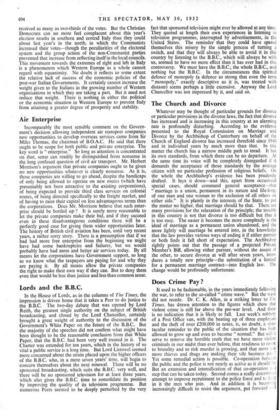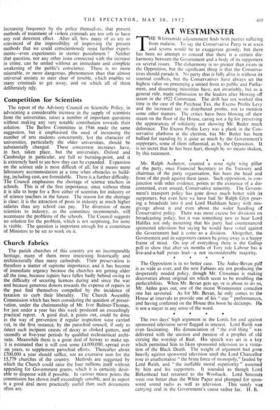Does Crime Pay ?
It used to be fashionable, in the years immediately following the war, to refer to the so-called " crime wave." But the wave did not recede. Dr. C. K. Allen, in a striking letter to The Times, has drawn attention to the figures which show that violent crime is still far above the pre-war level. And there is no indication that it is likely to fall. Last week's robbery of a Post Office van, with the beating up of three employees and the theft of over £200,000 in notes, is, no doubt, a spec. tacular reminder to the public of the situation that has been allowed to grow up and even to become " normal." But will it serve to remove the horrible truth that we have more violent criminals in our midst than ever before, that readiness to re,ort to brutality and to risk murder is growing, and that more and more thieves and thugs are making their vile business pa■ Yet some remedial action is possible. Co-operation betv,o,Is.n the public and the police is not nearly as active as it should But an extension and intensification of that co-operation step that can be taken today. Second comes a really deterni attempt to improve recruitment to the police force and to 1 in it the men who join. And in addition it is becoi, increasingly difficult to resist the argument, put forward increasing frequency by the police themselves, that present methods of treatment of violent criminals are too soft to have any real deterrent effect. After all, how many of us are so convinced of 'the impossibility of improving the present methods that we could conscientiously resist further experi- ments—even experiments in sterner punishment ? Neither that question, nor any other issue connected with the increase in crime, can be settled without an immediate and complete awakening of the public's conscience. There is no more miserable, or more dangerous, phenomenon than that almost universal anxiety to steer clear of trouble, which enables so many criminals to get away, and on which all of them deliberately rely.











































 Previous page
Previous page